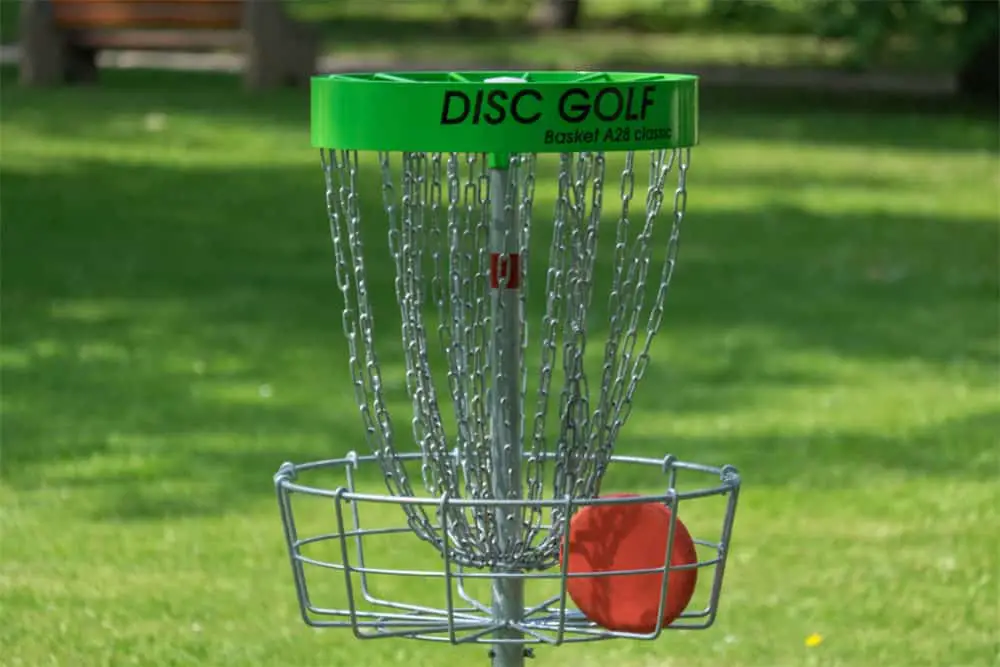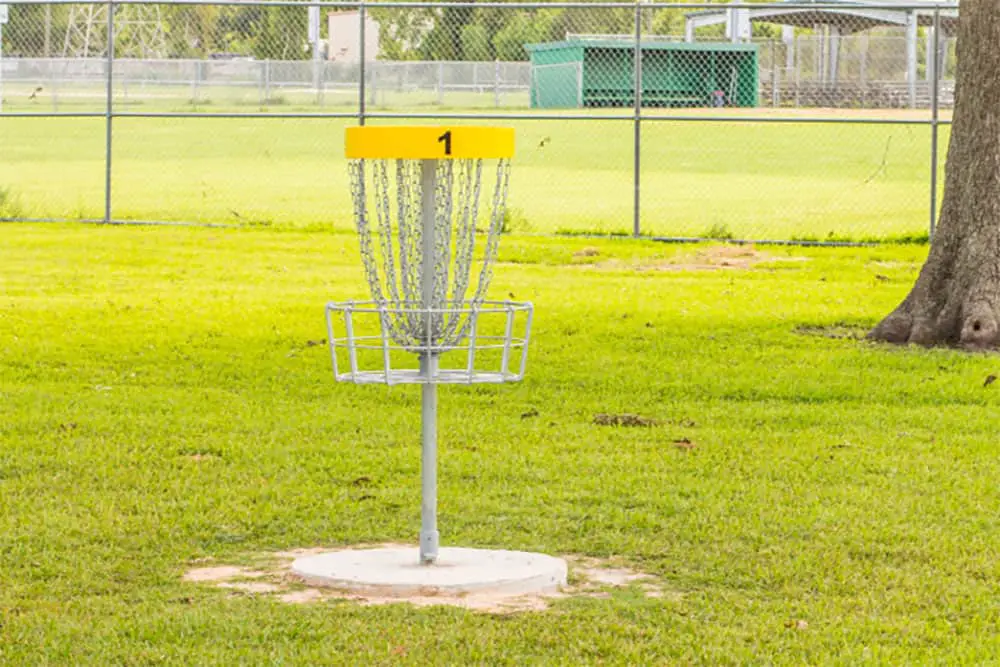So, you’re in the mood for a round of disc golf. You’re really excited to hit the course. You’ve been practicing religiously and can’t wait to show off your skills to your opponents and friends. You start playing and shock, horror.
You have found the water! Surely this is the last place you want your disc to end up, right? Well, firstly, there’s no need to worry as all disc golfers know this feeling. It’s just part of the game.

If only the basket was placed there instead of the water! After you have run out of expletives, you may be wondering if the water is out of bounds. What happens now your disc has landed in the water?
Well, if this occurs, you will have to take a penalty stroke. The first challenge will be retrieving your disc from the water. If this is not possible, it means you will lose your disc as well as a stroke in the process.
So, let’s find out what the rules are when your disc golf disc lands in the water. In this article, we will guide you on the dos and don’ts if this occurs and whether it is deemed to be out of bounds in the game of disc golf.
Can I Get The Disc Out Of The Water?
The first thing you need to find out is whether you can actually retrieve your disc from the water.
Unfortunately, so many disc golfers have lost discs as they plummeted to the depths of different water hazards along the course. But, if you think you can get it back, you may be wondering what the best ways are of doing so. Let’s take a look.
There are a few options you can choose from when getting your wet disc back. The first, and most obvious option, is to go into the water and grab it yourself. Simply trek into the wild and wet wilderness of the disc golf course you’re on and find your disc once again.
Who knows, you may find more. However, we do not recommend this option as you could cut your feet quite badly and there could be other items at the bottom of the water that you wouldn’t want sticking you.
Furthermore, there are some slightly larger concerns than getting wet such as the possibility of snakes, alligators, and leeches lurking in the water. Surely there is a better way.
Luckily, there is a better and safer option. You can use a Dynamic Discs Disc Golden Retriever. This simple contraption gets thrown into the water to grab your disc and drag it back to shore. This way, you get your favorite disc to continue playing with on the day.
However, this may mean you have to take a penalty stroke but, hey, at least you get your disc back!
Our final option is to ensure you have a floating disc in your bag. These should also be taken with you for those holes where water is abundant and the risk of throwing your disc into a waterhole is prevalent.
Of course, you don’t have to carry a floating disc at all times but only for holes with crazy amounts of water. We suggest using the Innova Dragon for such water holes to be on the safe side.
Is My Disc Out Of Bonds Once It Lands In The Water?
Even if you have got your disc out from the grasp of Poseidon, does this mean it was out of bounds? Simply put, yes, if your disc lands in the water, it is out of bounds. But, there’s more to it than this.

On the majority of holes that have water on them, this water, or any body of water for that matter, is usually marked as “out of bounds.” The only way this instance can not be out of bounds is if the disc landed in a puddle of water that was the result of earlier rainfall. If this occurs, then the disc is still playable.
The casual water rule
You may have heard about the casual water rule in disc golf. Well, casual water is a body of water that is pointed out where the disc is still playable and, therefore, still in bounds.
So, if your disc is thrown into a puddle from the previous night’s rainfall, you are allowed to continue playing without any penalty stroke.
For you to continue playing on that hole, you just have to face up to the fact that your feet may get a little wet. The PDGA’s casual area rules also state that the “lie may be relocated to the nearest lie which is farther from the target and is on the line of play, at the nearest point that provides itself.”
PDGA Rules For Regular Water Hazards
If you want to play by official rules and regulations, you need to follow the PDGA rules for regular water hazards. Their main rule for a water hazard area is played according to their Out of Bounds rule 806.02.
“A disc that cannot be found is considered to be out-of-bounds if there is compelling evidence that the disc came to rest within an out-of-bounds area. In the absence of such evidence, the disc is considered lost and play proceeds according to rule 805.03 (C).”
Another rule (805.03) says that you have just three minutes to find your disc after it has been lost to the waters. However, the group of players who are playing alongside the owner of the said disc must help them find it.
If the owner and fellow players are unable to find the disc or if it can not be retrieved from the water, then it must be played as a lost disc and a penalty stroke must be taken.
If you’re playing informally with friends and just having some fun, you are allowed to throw the disc from the water (look out for alligators). In this instance, you can forget about the out-of-bounds rule as well as the penalty strike, as long as you find the disc.
Even if you can not find your disc, you will still have another throw after you threw your last disc into the water.
In Summary
Disc + water = out of bounds. But, play casually and you can forget about this rule. We just recommend one thing – try not to throw your disc into the water!